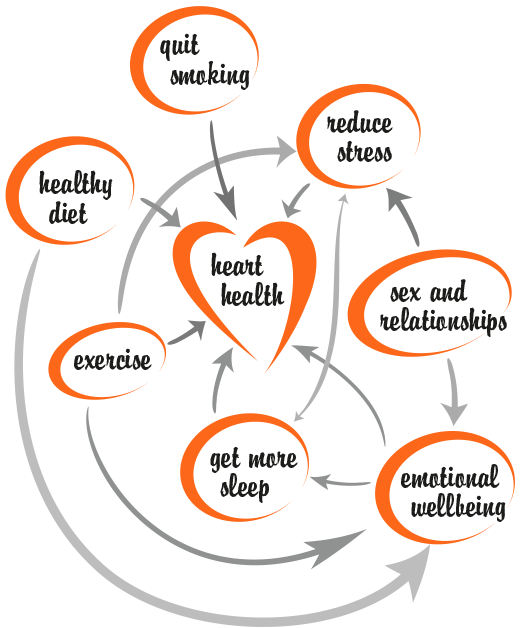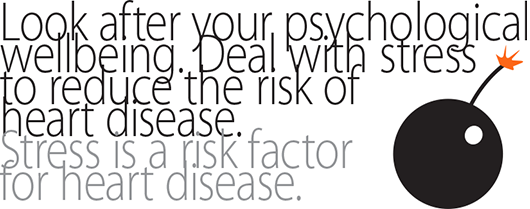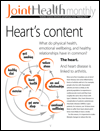In this issue
Listening to you Arthritis Consumer Experts (ACE)
JointHealth™ insight Published February 2013


Nine out of ten Canadians are at risk of heart disease, but some inflammatory forms of arthritis add to it. For example, people who live with rheumatoid arthritis are twice as likely as the general population to experience a cardiovascular event and they have roughly the same risk as those with type 2 diabetes. Also, heart disease is a complication of systemic autoimmune rheumatic diseases (SARDs). Lupus patients, for instance, are 10 times more likely to suffer from heart attack and 8 times more likely to have a stroke.
For this reason, it is important to make lifestyle changes to reduce the risk.

Those living with arthritis may experience more stress than healthier people due to reduced life quality, disability, and inability to work as much or at all, or take part in their usual activities. Such stress may be unavoidable, so it is important to make a plan to manage the stress. If you are feeling out of control, cranky, fearful, and ill, stress could be further harming your health.
The first step to managing your stress is figuring out what causes you to feel stress and how you react to it. Everybody experiences stress in different ways and it may change for one person depending on how long the stress has lasted. Some people may notice they:
If the stress is not well managed for too long, it can lead to depression, high blood pressure, heart disease, and stroke. For people with inflammatory forms of arthritis, in particular, heart disease is an even greater risk.
There are many ways to deal with stress. You will have your own ways that make the most sense to you. The following are suggestions that you can tailor to your own needs and interests:

Tips for getting enough sleep:

Exercise will slow the progression of arthritis and physical decline as you age and cuts the risk of heart disease by nearly half.

In some cases, it may be difficult to tell whether you are experiencing a reaction to stress or a symptom of arthritis. To help separate the two, you may find it helpful to keep a journal to track how you react to certain situations and events. If you are finding that headaches occur after writing an exam or after a bad day at work, it may be stress. If they happen after a workout, you may have overdone it. Take your journal to your doctor and together you can determine if arthritis or other factors are at play.
With the journaling, you could go one step further and track the foods you eat, and in doing so you could accomplish two more things:

Sex: something we all think about, but hardly ever like to discuss. Commonly, people with arthritis may experience changes in their sexual lives. Living with a chronic illness can cause fatigue, depression, pain, and lower self-esteem, all of which can reduce your interest in sexual activity. Both you, the person with arthritis, and your partner may worry about causing injury or exacerbating your pain.
If this aspect of your life is important to you, but you are experiencing barriers to enjoyable sex, here are a few suggestions that may help improve your comfort during sexual activity:
Listening to you
We hope you find this information of use. Please tell us what you think by writing to us or emailing us at info@jointhealth.org. Through your ongoing and active participation, ACE can make its work more relevant to all Canadians living with arthritis.
Update your email or postal address
Please let us know of any changes by contacting ACE at info@jointhealth.org. This will ensure that you continue to receive your free email or print copy of JointHealth™ monthly.
Arthritis Consumer Experts (ACE)
Who We Are
Arthritis Consumer Experts (ACE) provides research-based education, advocacy training, advocacy leadership and information to Canadians with arthritis. We help empower people living with all forms of arthritis to take control of their disease and to take action in healthcare and research decision making. ACE activities are guided by its members and led by people with arthritis, leading medical professionals and the ACE Advisory Board. To learn more about ACE, visit: www.jointhealth.org
Acknowledgements
Over the past 12 months, ACE received unrestricted grants-in-aid from: AbbVie Corporation, Amgen Canada, Arthritis Research Centre of Canada, Bristol-Myers Squibb Canada, Canadian Institutes of Health Research, GlaxoSmithKline, Hoffman-La Roche Canada Ltd., Janssen Inc., Novartis Canada, Pfizer Canada, Sanofi-aventis Canada Inc., Takeda Canada, Inc., and UCB Canada Inc. ACE also receives unsolicited donations from its community members (people with arthritis) across Canada.
ACE thanks these private and public organizations and individuals.
Disclaimer
The material contained on this website is provided for general information only. This website should not be relied on to suggest a course of treatment for a particular individual or as a substitute for consultation with qualified health professionals who are familiar with your individual medical needs. Should you have any healthcare related questions, you should contact your physician. You should never disregard medical advice or delay in seeking it because of something you have read on this or any website.
This site may provide links to other Internet sites only for the convenience of World Wide Web users. ACE is not responsible for the availability or content of these external sites, nor does ACE endorse, warrant or guarantee the products, services or information described or offered at these other Internet sites.
Although the information presented on this website is believed to be accurate at the time it is posted, this website could include inaccuracies, typographical errors or out-of-date information. This website may be changed at any time without prior notice.

What do physical health, emotional wellbeing, and healthy relationships have in common? The heart. And heart disease is linked to arthritis.

Nine out of ten Canadians are at risk of heart disease, but some inflammatory forms of arthritis add to it. For example, people who live with rheumatoid arthritis are twice as likely as the general population to experience a cardiovascular event and they have roughly the same risk as those with type 2 diabetes. Also, heart disease is a complication of systemic autoimmune rheumatic diseases (SARDs). Lupus patients, for instance, are 10 times more likely to suffer from heart attack and 8 times more likely to have a stroke.
For this reason, it is important to make lifestyle changes to reduce the risk.

Those living with arthritis may experience more stress than healthier people due to reduced life quality, disability, and inability to work as much or at all, or take part in their usual activities. Such stress may be unavoidable, so it is important to make a plan to manage the stress. If you are feeling out of control, cranky, fearful, and ill, stress could be further harming your health.
The first step to managing your stress is figuring out what causes you to feel stress and how you react to it. Everybody experiences stress in different ways and it may change for one person depending on how long the stress has lasted. Some people may notice they:
- Have difficulty sleeping
- Become abruptly angry
- Cry suddenly for no reason
- Have muscle tension (usually in the neck and jaw) and headaches
- Eat too much or too little (or poorly)
- Have a rapid heart rate
- Feel dizzy or light-headed
- Get chronic indigestion
Eating well, keeping physically active, and reducing stress are each understood to be ways to protect your health. You may also know that integrating all of these things into your life will also benefit, but did you know that maintaining emotionally supportive and close relationships with friends and spouses or partners is too? Research has shown that people in relationships in which they feel positive, connected, and comfortable sharing feelings may experience a reduction in their physical disability and pain, and fewer symptoms of depression and anxiety.
If the stress is not well managed for too long, it can lead to depression, high blood pressure, heart disease, and stroke. For people with inflammatory forms of arthritis, in particular, heart disease is an even greater risk.
There are many ways to deal with stress. You will have your own ways that make the most sense to you. The following are suggestions that you can tailor to your own needs and interests:
- Try to stay positive. Though optimism is not a cure for disease, including arthritis, research has shown that positive people are healthier and live longer than those who do not. The benefits of feeling optimistic include improving immune system function, regulating hormones, regulating the cardiovascular (heart) system, and improving coping abilities.
- Look for ways to be more active. Exercise controls the risk factors for heart disease (high blood cholesterol, high blood pressure, and obesity) and reduces the risk of cancer, type 2 diabetes, osteoporosis, and arthritis. A bonus? It also helps to reduce stress and prevent depression. The weight loss that will likely occur because you are exercising more will put less strain on your heart, not to mention your joints. Even a few minutes a day of walking will improve your overall wellbeing.
- Timeouts are not just for kids. If you are feeling overwhelmed with stress, take a short break. Go be by yourself for a few minutes, take a walk, read a book, or do some other positive activity that is entirely different from the thing that is causing your stress reaction.
- Try to set realistic goals for yourself. Trying to do too much could be adding to your stress. One way to avoid this problem is to make lists of everything you want to get done, then figure out which ones are the most important and take care of those first. When you are done, cross them off your list (this visual can be deeply satisfying). If you cannot get them done, then change your priorities (in other words, let go). If you can’t get all your must-do items off your list, then try to delegate them to others. Don’t forget to reward yourself when you reach your goal.
- Eat more healthfully by adding more vegetables and fruits to your diet and cutting back on processed foods. Healthy foods that are low in sodium and sugar and high in vitamins and minerals will nourish your body and protect your heart.
- Try to get enough sleep. We realize this may be easier said than done. For those of you with depression and stress along with your disease, you may find it tough to fall asleep or stay asleep. Furthermore, the pain that comes with your disease may wake you throughout the night, preventing you from getting a deep sleep. Finding ways to relax, such as taking warm baths before bed may help. To help you manage depression and stress, you may find the January 2011 issue of JointHealth™ monthly useful. Email info@jointhealth.org for a print copy or visit www.jointhealth.org to read it online.
- Maintain healthy relationships. Relationships can be challenging for you to maintain if you live with arthritis since you may often be dealing with depression, fatigue, and pain. However, healthy and supportive friendships can help you through bad times with your disease and make it easier to overcome some of your day-to-day emotional and physical hurdles.
Visit the Heart and Stroke Foundation website,
www.heartandstroke.com to find out:
www.heartandstroke.com to find out:
- The warning signs of heart disease
- What to do if you are experiencing any of these signs
- The risk factors for heart disease
- Lifestyle changes that may help prevent or reduce the risk of heart disease

Tips for getting enough sleep:
- Limit your caffeine intake, and try to avoid it altogether past mid-afternoon (or four to six hours before you go to bed)
- Do your best to go to bed at the same time each night
- Avoid distractions in your bedroom like television or smartphones
- Unwind shortly before bed, rather than engaging in activities that will make you feel more alert

Exercise will slow the progression of arthritis and physical decline as you age and cuts the risk of heart disease by nearly half.

In some cases, it may be difficult to tell whether you are experiencing a reaction to stress or a symptom of arthritis. To help separate the two, you may find it helpful to keep a journal to track how you react to certain situations and events. If you are finding that headaches occur after writing an exam or after a bad day at work, it may be stress. If they happen after a workout, you may have overdone it. Take your journal to your doctor and together you can determine if arthritis or other factors are at play.
With the journaling, you could go one step further and track the foods you eat, and in doing so you could accomplish two more things:
- Ensure you are not taking in too many calories and that you are getting enough variety from all the food groups.
- Find out if certain foods may be contributing to your flares.

Sex: something we all think about, but hardly ever like to discuss. Commonly, people with arthritis may experience changes in their sexual lives. Living with a chronic illness can cause fatigue, depression, pain, and lower self-esteem, all of which can reduce your interest in sexual activity. Both you, the person with arthritis, and your partner may worry about causing injury or exacerbating your pain.
If this aspect of your life is important to you, but you are experiencing barriers to enjoyable sex, here are a few suggestions that may help improve your comfort during sexual activity:
- Try different sexual positions. Use well-placed padding, pillows, or wedge-shaped pillows to help ease joint pain and provide more comfortable position options.
- Take a shower or bubble bath beforehand to warm up the joints, to help with sore muscles, and to relax.
- Avoid smoking and limit the amount of alcohol you drink before anticipated sexual activity. Both reduce sexual functioning.
- Avoid eating within two hours beforehand.
- You may find it helpful to take a pain medication about a half hour before sex.
- Have an open discussion with your physician or rheumatologist about any medications that may be affecting your desire for sex or your sexual functioning. Your doctor may be able to offer some solutions.
- Try to find times of the day when your energy is at its peak to plan for sexual activity.
- Talk to your partner about what you like and don’t like, what hurts and what doesn’t hurt. You may find the honesty will enhance your relationship, and you will likely be more comfortable during sexual activity because of communicating what works for you. If you are finding these conversations difficult, you may benefit from seeing a sex therapist.
- There’s more than one way to be sexual. Intercourse is not the end all and be all of a sexual relationship. Try to make holding hands, hugging, touching, and kissing more prominent in your daily interaction with your partner. These are just as satisfying, and this kind of connectedness will likely increase both your and your partner’s desire for sex if that was waning.
The benefits of sex and physical contact (like hugging) include improving bonds between people and building trust, helping to reduce pain, promoting sleep, reducing stress, boosting immunity, burning calories, improving self-esteem, and improving heart health.
Listening to you
We hope you find this information of use. Please tell us what you think by writing to us or emailing us at info@jointhealth.org. Through your ongoing and active participation, ACE can make its work more relevant to all Canadians living with arthritis.
Update your email or postal address
Please let us know of any changes by contacting ACE at info@jointhealth.org. This will ensure that you continue to receive your free email or print copy of JointHealth™ monthly.
Arthritis Consumer Experts (ACE)
Who We Are
Arthritis Consumer Experts (ACE) provides research-based education, advocacy training, advocacy leadership and information to Canadians with arthritis. We help empower people living with all forms of arthritis to take control of their disease and to take action in healthcare and research decision making. ACE activities are guided by its members and led by people with arthritis, leading medical professionals and the ACE Advisory Board. To learn more about ACE, visit: www.jointhealth.org
Acknowledgements
Over the past 12 months, ACE received unrestricted grants-in-aid from: AbbVie Corporation, Amgen Canada, Arthritis Research Centre of Canada, Bristol-Myers Squibb Canada, Canadian Institutes of Health Research, GlaxoSmithKline, Hoffman-La Roche Canada Ltd., Janssen Inc., Novartis Canada, Pfizer Canada, Sanofi-aventis Canada Inc., Takeda Canada, Inc., and UCB Canada Inc. ACE also receives unsolicited donations from its community members (people with arthritis) across Canada.
ACE thanks these private and public organizations and individuals.
Disclaimer
The material contained on this website is provided for general information only. This website should not be relied on to suggest a course of treatment for a particular individual or as a substitute for consultation with qualified health professionals who are familiar with your individual medical needs. Should you have any healthcare related questions, you should contact your physician. You should never disregard medical advice or delay in seeking it because of something you have read on this or any website.
This site may provide links to other Internet sites only for the convenience of World Wide Web users. ACE is not responsible for the availability or content of these external sites, nor does ACE endorse, warrant or guarantee the products, services or information described or offered at these other Internet sites.
Although the information presented on this website is believed to be accurate at the time it is posted, this website could include inaccuracies, typographical errors or out-of-date information. This website may be changed at any time without prior notice.
